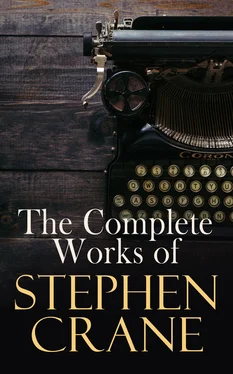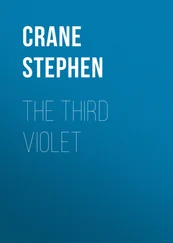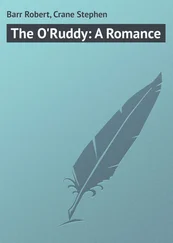As he went through envelope after envelope, the desks about him gradually were occupied by young men who entered from the hall with their faces still red from the cold of the streets. For the most part they bore the unmistakable stamp of the American college. They had that confident poise which is easily brought from the athletic field. Moreover, their clothes were quite in the way of being of the newest fashion. There was an air of precision about their cravats and linen. But on the other hand there might be with them some indifferent westerner who was obliged to resort to irregular means and harangue startled shop-keepers in order to provide himself with collars of a strange kind. He was usually very quick and brave of eye and noted for his inability to perceive a distinction between his own habit and the habit of others, his western character preserving itself inviolate amid a confusion of manners.
The men, coming one and one, or two and two, flung badinage to all corners of the room. Afterward, as they wheeled from time to time in their chairs, they bitterly insulted each other with the utmost good-nature, taking unerring aim at faults and riddling personalities with the quaint and cynical humour of a newspaper office. Throughout this banter, it was strange to note how infrequently the men smiled, particularly when directly engaged in an encounter.
A wide door opened into another apartment where were many little slanted tables, each under an electric globe with a green shade. Here a curly-headed scoundrel with a corncob pipe was hurling paper balls the size of apples at the head of an industrious man who, under these difficulties, was trying to draw a picture of an awful wreck with ghastly-faced sailors frozen in the rigging. Near this pair a lady was challenging a German artist who resembled Napoleon III. with having been publicly drunk at a music hall on the previous night. Next to the great gloomy corridor of this sixteenth floor was a little office presided over by an austere boy, and here waited in enforced patience a little dismal band of people who wanted to see the Sunday editor.
Baker took a manuscript and after glancing about the room, walked over to a man at another desk, Here is something that. I think might do," he said. The man at the desk read the first two pages. "But where is the photogragh " " he asked then. "There should be a photograph with this thing."
"Oh, I forgot," said Baker. He brought from his desk a photograph of the babe that had been born lacking arms and one eye. Baker's superior braced a knee against his desk and settled back to a judicial attitude. He took the photograph and looked at it impassively. "Yes," he said, after a time, "that's a pretty good thing. You better show that to Coleman when he comes in."
In the little office where the dismal band waited, there had been a sharp hopeful stir when Rufus Coleman, the Sunday editor, passed rapidly from door to door and vanished within the holy precincts. It had evidently been in the minds of some to accost him then, but his eyes did not turn once in their direction. It was as if he had not seen them. Many experiences had taught him that the proper manner of passing through this office was at a blind gallop.
The dismal band turned then upon the austere office boy. Some demanded with terrible dignity that he should take in their cards at once. Others sought to ingratiate themselves by smiles of tender friendliness. He for his part employed what we would have called his knowledge of men and women upon the group, and in consequence blundered and bungled vividly, freezing with a glance an annoyed and importunate Arctic explorer who was come to talk of illustrations for an article that had been lavishly paid for in advance. The hero might have thought he was again in the northern seas. At the next moment the boy was treating almost courteously a German from the cast side who wanted the Eclipse to print a grand full page advertising description of his invention, a gun which was supposed to have a range of forty miles and to be able to penetrate anything with equanimity and joy. The gun, as a matter of fact, had once been induced to go off when it had hurled itself passionately upon its back, incidentally breaking its inventor's leg. The projectile had wandered some four hundred yards seaward, where it dug a hole in the water which was really a menace to navigation. Since then there had been nothing tangible save the inventor, in splints and out of splints, as the fortunes of science decreed. In short, this office boy mixed his business in the perfect manner of an underdone lad dealing with matters too large for him, and throughout he displayed the pride and assurance of a god.
As Coleman crossed the large office his face still wore the stern expression which he invariably used to carry him unmolested through the ranks of the dismal band. As he was removing his London overcoat he addressed the imperturbable back of one of his staff, who had a desk against the opposite wall. "Has Hasskins sent in that drawing of the mine accident yet?" The man did not lift his head from his work-, but he answered at once: "No; not yet." Coleman was laying his hat on a chair. "Well, why hasn't he?" he demanded. He glanced toward the door of the room in which the curly-headed scoundrel with the corncob pipe was still hurling paper balls at the man who was trying to invent the postures of dead mariners frozen in the rigging. The office boy came timidly from his post and informed Coleman of the waiting people. "All right," said the editor. He dropped into his chair and began to finger his letters, which had been neatly opened and placed in a little stack by a boy. Baker came in with the photograph of the miserable babe.
It was publicly believed that the Sunday staff of the Eclipse must have a kind of aesthetic delight in pictures of this kind, but Coleman's face betrayed no emotion as he looked at this specimen. He lit a fresh cigar, tilted his chair and surveyed it with a cold and stony stare. "Yes, that's all right," he said slowly. There seemed to be no affectionate relation between him and this picture. Evidently he was weighing its value as a morsel to be flung to a ravenous public, whose wolf-like appetite, could only satisfy itself upon mental entrails, abominations. As for himself, he seemed to be remote, exterior. It was a matter of the Eclipse business.
Suddenly Coleman became executive. "Better give it to Schooner and tell him to make a half-page—-or, no, send him in here and I'll tell him my idea. How's the article? Any good? Well, give it to Smith to rewrite."
An artist came from the other room and presented for inspection his drawing of the seamen dead in the rigging of the wreck, a company of grizzly and horrible figures, bony-fingered, shrunken and with awful eyes. "Hum," said Coleman, after a prolonged study, "that's all right. That's good, Jimmie. But you'd better work 'em up around the eyes a little more." The office boy was deploying in the distance, waiting for the correct moment to present some cards and names.
The artist was cheerfully taking away his corpses when Coleman hailed him. "Oh, Jim, let me see that thing again, will you? Now, how about this spar? This don't look right to me."
"It looks right to me," replied the artist, sulkily.
"But, see. It's going to take up half a page. Can't you change it somehow "
How am I going to change it?" said the other, glowering at Coleman. "That's the way it ought to be. How am I going to change it? That's the way it ought to be."
"No, it isn't at all," said Coleman. "You've got a spar sticking out of the main body of the drawing in a way that will spoil the look of the whole page."
The artist was a man of remarkable popular reputation and he was very stubborn and conceited of it, constantly making himself unbearable with covert, threats that if he was not delicately placated at all points, he would freight his genius over to the office of the great opposition journal.
Читать дальше












